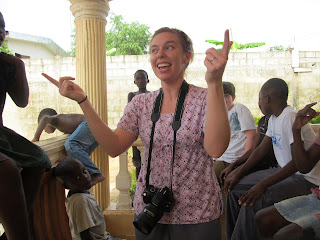Coming back to the
Upon arrival, the chorus of comments always begins. The comments could be brought on by most anything—a description of a person or event, a photograph, a souvenir, or sometimes just the simple mention of the country name. They are most often stated in question form, although the questioner most always understands the question to be a rhetorical one:
“Doesn’t being there make you thankful to live in the
I never know quite how to answer. I think that’s likely because I don’t know exactly what’s meant by the question itself. Is the questioner asking whether I’m thankful to be in a place where the vast majority of people put trash in actual trash receptacles? Call me shallow, but I am. Are they asking whether I’m thankful to live somewhere that law is enforced and rights, for the most part at least, are upheld? I certainly am. Are they asking about living in a country where people, regardless of background or socio-economic status, can realistically dream of making an impact on the world around them? It’s an incredible blessing. Are they wondering whether I’m thankful to live in a place where my Evangelical Christian faith can co-exist with my Roman Catholic neighbors to the left, my Buddhist neighbors to the right, my Muslim neighbors across the street, and my Mormon neighbors across the next street? Are they asking whether I’m thankful that they can share their faith with me, just as I can with them, and we have no fear of violent response or governmental intervention? For these things and more, I am indeed truly thankful.
However, although I’d love to give the benefit of the doubt, I’m not sure that’s what most mean by their question. The other side of the question makes for a more difficult response. Am I thankful for the luxuries that can be ours for the right price, and the massive debt that most carry in order to accommodate them? Am I thankful for having so much more than I could possibly need in every area that I can think of, while others around the world struggle to simply have the basics? Am I thankful for a country full of high-level, white collar executives and professionals who either choose to or are asked to work so many hours that both their families and their health are stretched to the limit, if they haven’t already broken? Am I thankful for discount stores full of cheap products at incredible prices, often produced through questionable practices, which encourage me to get more of what I already have and still don’t need? Am I thankful for a plethora of recreational activities that fill our schedules so that nearly every spare moment is planned and the running never stops? Those questions, and others like them, are much more difficult to answer. There are great blessings embedded in each of these statements, and I don’t want to reject the positive aspects of them. But as Derek Webb wondered aloud on his album Stockholm Syndrome: “It seems it’s never quite worth what you give up to get it.”
This is a great country, full of beauty both externally and within its people. We are blessed beyond measure, and beyond our ability to comprehend and respond to in appropriate thankfulness. However, unless we take great care, our worship zips right past the Blessor to the blessings themselves, which according to Paul in Romans 1, is the very definition of idolatry. Even when our stuff remains in its proper place—when we recognize it for the “stuff” that it is—it still has an incredible ability to distract. In much of the world, the lives of those who follow Jesus are simple, and His joy exudes from them. For us, our faith may be simple, but our lives are so complex that our simple faith is rarely seen—not by us, and certainly not by the world around us.
So I’m a bit disoriented. I’ve returned to my home and my office and my life, and they are all filled with stuff. Good stuff, at least for the most part. Necessary stuff, most from our culture would say. And I don’t despise that stuff, or wish it away—I truly don’t. I seek to be thankful for all that I have, and to steward it well. But I can’t help but think of my brothers and sisters around the world who live much more simply, and on the surface at least, often much more joyfully and with greater generosity. I can’t help but think of the One I call Lord—the homeless carpenter turned preacher, who couldn’t have owned more than He could carry. And then I wonder where the line is.
I don’t know the answer. Which makes me even more thankful that I know the Answer.


















